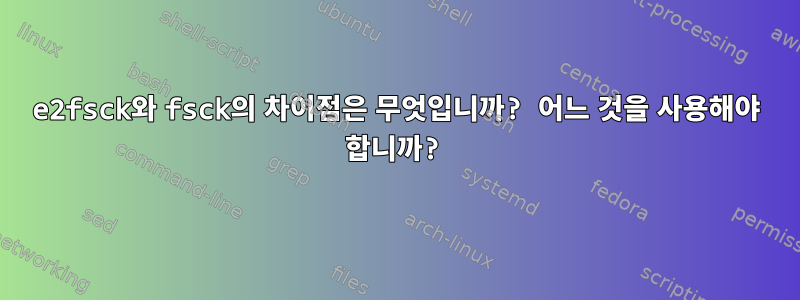
dmesg를 실행할 때 이 오류 메시지가 나타납니다.
EXT3-fs (sdd1): using internal journal
EXT3-fs (sdd1): mounted filesystem with ordered data mode
EXT4-fs (sda1): warning: mounting fs with errors, running e2fsck is recommended
EXT4-fs (sda1): mounted filesystem with ordered data mode. Opts:
EXT4-fs (sdb1): warning: maximal mount count reached, running e2fsck is recommended
EXT4-fs (sdb1): mounted filesystem with ordered data mode. Opts:
EXT4-fs (sdc1): warning: maximal mount count reached, running e2fsck is recommended
EXT4-fs (sdc1): mounted filesystem with ordered data mode. Opts:
Adding 4194296k swap on /dev/sdd2. Priority:-1 extents:1 across:4194296k SSD
kjournald starting. Commit interval 5 seconds
EXT3-fs (loop0): warning: maximal mount count reached, running e2fsck is recommended
EXT3-fs (loop0): using internal journal
sdd는 잘 작동하는 것 같습니다. 이것이 기본 파티션입니다. sda에서 sdc로 작동하지 않습니다. 제거하고 fsck를 수행해야 합니까? 하지만 어떤 fsck를 사용해야 합니까? e2fsck? e4fsck? 어느 것? 여기서 사용하는 것은 ext4입니다.
loop0이 무엇인지 모르겠습니다.
시스템이 꽤 안 좋게 설정된 것 같습니다. EXT3-fs(loop0): 순서화된 데이터 모드로 마운트된 파일 시스템
shutdown -rf를 할 수 있다고 들었습니다. 누군가 이미 이 작업을 수행했습니다. 시스템이 다시 온라인 상태가 되었지만 여전히 이 메시지가 나타납니다. 무엇을 제공합니까?
답변1
fsck도구의 원래 이름입니다. 새로운 파일 시스템이 등장하면 각 파일 시스템에 대한 특정 도구가 필요합니다. 따라서 fsck이는 프런트 엔드 역할만 하며 자체적으로 수행할 수 없는 작업을 수행하기 위해 적절한 파일 시스템 *fsck를 호출합니다.
fsck 매뉴얼 페이지에서
fs 특정 옵션
Options which are not understood by fsck are passed to the filesystem-specific checker. These arguments must not take arguments, as there is no way for fsck to be able to properly guess which arguments take options and which don't. Options and arguments which follow the -- are treated as file system-specific options to be passed to the file system-specific checker. Please note that fsck is not designed to pass arbitrarily complicated options to filesystem-specific checkers. If you're doing something complicated, please just execute the filesystem-specific checker directly. If you pass fsck some horribly complicated option and arguments, and it doesn't do what you expect, don't bother reporting it as a bug. You're almost certainly doing something that you shouldn't be doing with fsck.
대부분의 일반적인 작업은 패스만으로 처리할 수 있습니다 fsck.
다른 도구?
내 Fedora 14 시스템을 잠깐 살펴보면 다음과 같은 fsck* 도구가 표시됩니다.
$ fsck
fsck fsck.ext2 fsck.ext4 fsck.msdos fsck.vfat
fsck.cramfs fsck.ext3 fsck.ext4dev fsck.ntfs fsck.xfs
이 locate명령은 다음 내용을 더 보여줍니다.
$ locate fsck|grep "^/sbin"
/sbin/dosfsck
/sbin/e2fsck
/sbin/fsck
/sbin/fsck.cramfs
/sbin/fsck.ext2
/sbin/fsck.ext3
/sbin/fsck.ext4
/sbin/fsck.ext4dev
/sbin/fsck.msdos
/sbin/fsck.ntfs
/sbin/fsck.vfat
/sbin/fsck.xfs
두 목록 모두에서 거의 모든 파일 시스템 유형에 자체 fsck* 도구가 있음을 알 수 있습니다. 이러한 도구 중 일부는 다음과 같은 다목적입니다 dos2fsck.
$ ls -l /sbin/|grep fsck | grep dos
-rwxr-xr-x 1 root root 54424 Apr 5 2011 dosfsck
lrwxrwxrwx 1 root root 7 Aug 3 2011 fsck.msdos -> dosfsck
lrwxrwxrwx 1 root root 7 Aug 3 2011 fsck.vfat -> dosfsck


